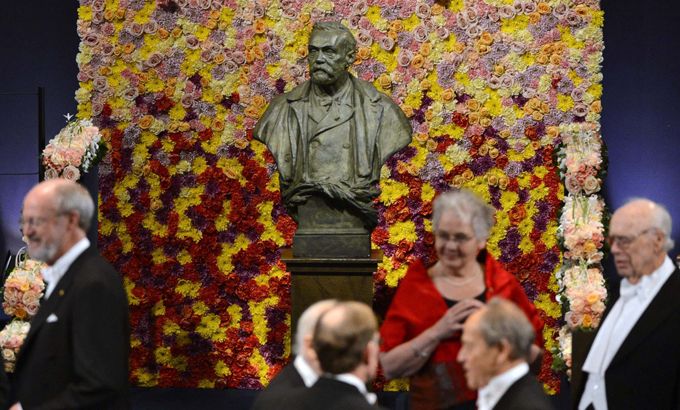
Is the Nobel Peace Prize losing its prestige?
This year’s award to the EU is adding to growing criticism over the choice of winners and the politics behind it.
It has been described as the most prestigious award in the world – the Nobel Peace Prize, whose past winners include Martin Luther King, Mother Teresa and Nelson Mandela.
But this year’s award is adding to growing criticism over the choice of winners – and the politics behind the decisions.
|
“We’re surprised by the last designations by the Nobel committee, in the case of Obama, Al Gore, and now the European Union, when these are countries at war. They are part of NATO. They invade, plunder, kill. We’ve seen it in Libya, Syria, we see it all over the world. The military bases they have in the Malvinas Islands. So, we’re worried a prize like the Nobel, which has to be for contributing to peace, can be used in this way.“ – Adolfo Perez Esquivel, the 1980 Nobel winner |
The European Union has been awarded this year’s Peace Prize and the Nobel committee praised leaders for fostering peace on a continent that had been ravaged by war.
Keep reading
list of 4 itemsPalestinian Prisoner’s Day: How many are still in Israeli detention?
‘Mama we’re dying’: Only able to hear her kids in Gaza in their final days
Europe pledges to boost aid to Sudan on unwelcome war anniversary
It said: “The union and its forerunners have for over six decades contributed to the advancement of peace and reconciliation, democracy and human rights in Europe.”
But human rights groups argue the EU is undemocratic and maintains a large military presence – even as its people suffer the effects of an economic downturn.
Past leaders, including South African social rights activist Desmond Tutu are among those saying the EU does not deserve the award.
The controversy is stirring memories of the 2009 award given to US President Barack Obama in his first year in office – when he was commander-in-chief of a country at war in both Iraq and Afghanistan.
So, is the Nobel Peace Prize losing its prestige? And is it still contributing to world peace in the way Alfred Nobel had envisioned?
Inside Story, with presenter Hazem Sika, is joined by guests: Petros Fassoulas, the chairman of the European Movement UK campaign group; Fredrik Heffermehl, a former Norwegian lawyer and author of the book The Nobel Peace Prize: What Nobel Really Wanted.
|
“It’s an award for the European project, for the people and the institutions that, day after day for the last sixty years, have built a new Europe. It is a good moment to remind ourselves of what the European Union has done. It brings lasting peace between former enemies, who fought many devastating wars on the continent including two World Wars.” Jose Manuel Barroso, the president of the European Commission |
ABOUT THE NOBEL PEACE PRIZE:
- Alfred Nobel was a Swedish chemist and armaments manufacturer, whose inventions included dynamite
- He used his fortune to bequeath a series of prizes – the first being awarded in 1901; in addition to the Peace Prize, there are awards in Chemistry, Physics, Physiology or Medicine, and Literature
- Nobel’s will stated that the Peace Prize be administered by Norway, although it is unclear why
- The head of the Norwegian Nobel Committee is Thorbjorn Jagland, the current secretary-general of the Council of Europe
- Nobel asked that the prize be awarded to: “The person who shall have done the most or the best work for fraternity between nations, for the abolition or reduction of standing armies, and for the holding and promotion of peace congresses”
PAST WINNERS:
- The civil rights activist, Martin Luther King, was awarded the 1964 Peace Prize; he was recognised for his non-violent resistance to racial prejudice in the US
- Mother Teresa was awarded the prize in 1979; her charity work is now known the over the world
- Nelson Mandela was awarded the prize in 1993, for leading the drive towards peace and democracy in South Africa, and the end of apartheid
- In 1973, Henry Kissinger was rewarded for his work on the Vietnam peace accords, even though he instituted a secret bombing campaign against the North Vietnamese army
- Menachem Begin, the former Israeli prime minister, was a Nobel winner in 1978 – despite his involvement in the 1946 bomb attack on the King David hotel in Jerusalem which killed 91 people
- In 2009, the prize went to Barack Obama, less than a year after he became US president, for his “extraordinary efforts in international diplomacy” – despite the fact the he was leading a country at war in Iraq and Afghanistan
- In 2011, the Peace Prize was split among three women: Liberian President Ellen Johnson Sirleaf, Liberian peace activist Leymah Gbowee and Yemeni women’s rights campaigner Tawakkul Karman – raising concerns about whether the award was based on trying to boost the role of women, rather than real achievement